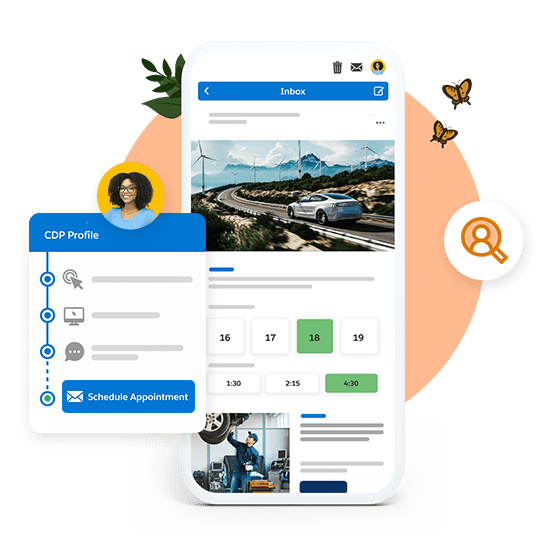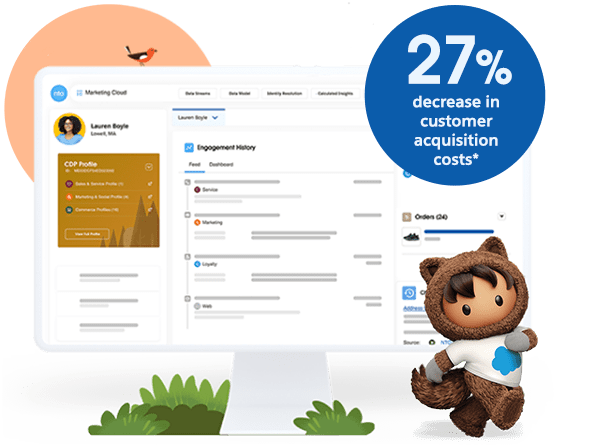The Salesforce Marketing Cloud Explained
Salesforce Marketing Cloud is a cloud-based digital marketing platform that provides tool and solutions for email marketing, mobile marketing, social media marketing, advertising and more. It allows businesses to engage with their customers across various channels and measure the impact of their marketing efforts.
Its features include marketing automation, campaign management, lead scoring, CRM integration, ad tracking and A/B testing. It also has an app exchange for pre-built integrations with third-party solutions like WordPress, Magento, WooCommerce and more. In this article, we take a look at the key features of Salesforce Marketing Cloud and how it can benefit your business.
Key Features of the Salesforce Marketing Cloud
1. Lead Scoring
Lead scoring in Salesforce Marketing Cloud allows you to track the behavior of your leads and determine the level of interest in your product or service based on their behavior on your website or app, as well as information on their past interactions with your brand.
For example, you can define rules for how a lead should be scored and keep track of which prospects are interested in your product or service by categorizing them into different lead categories based on their actions and behaviors.
You can also automatically score new leads as they come in and add them to the corresponding category as soon as they meet the criteria for that category. Click here to learn more about lead scoring.
2. A/B Testing
A/B testing allows you to compare two versions of a page, email message or other piece of content and see which one performs better in terms of engagement, conversions or other metrics.
You can test things like headlines, call-to-action buttons, images and other design elements to find out which ones create the best impression on your audience and increase conversions. Click here to learn more about A/B testing.
3. Automated Marketing
Automated marketing allows you to create a series of steps to automate the processes involved in running a marketing campaign such as sending emails to your contacts based on their actions on your website or social media page, or nurturing prospects through the sales funnel to increase conversion rates.
You can use the features included in automated marketing to create campaigns that are automatically triggered by a specific action or event such as a contact form submission, purchase or download. You can also use automated marketing to schedule a series of follow-up messages based on actions that your contacts take such as visiting a particular page on your site, making a purchase or engaging with one of your social media posts. Click here to learn more about automated marketing.
4. Email Automation 
Email automation allows you to send a series of messages to your subscribers or leads based on the actions they take on your website or social media page.
For example, you can use email automation to automatically send a welcome message to a new subscriber when they sign up for your mailing list, or send a follow up message to your contacts after they make an online purchase from your website.
You can also use email automation to create personalized messages and content based on your contact’s interactions with your content, for example sending an email reminding them to sign up for a webinar you created based on their history of engagement with past webinars.
Using email automation can help you stay engaged with your leads and contacts throughout the customer journey and help them to take action when they’re ready to buy from you. Click here to learn more about email automation.
Salesforce Marketing Cloud provides several benefits for your businesses, including:
Increased customer engagement: The platform’s tools allow businesses to engage with their customers across multiple channels and measure the impact of their marketing efforts.
Improved marketing efficiency: Marketing Cloud streamlines marketing processes, making it easier to manage campaigns, analyze data, and make data-driven decisions.
Personalized customer experiences: Marketing Cloud’s advanced segmentation and personalization capabilities enable businesses to deliver tailored experiences to individual customers.
Integrated customer data: Marketing Cloud integrates with other Salesforce products and can centralize customer data from various sources, providing a complete view of the customer.
Increased ROI: Marketing Cloud helps businesses to improve their marketing ROI by optimizing campaigns and analyzing data to make data-driven decisions.
Scalability: Marketing Cloud is a cloud-based platform, allowing businesses to scale their marketing efforts as their needs grow.
Access to innovative technologies: Salesforce Marketing Cloud is constantly innovating and adding new features, allowing businesses to stay ahead in the digital marketing landscape.
Decrease in customer acquisition costs: Utilising the Salesforce Marketing Cloud can result in decreased customer acquisition costs by increasing your conversion rates, driving ROI and maximise spend with unified, AI-driven analytics.

Examples of how businesses have used Salesforce Marketing Cloud to achieve their marketing goals:
Personalised email campaigns: A fashion retailer used Marketing Cloud to segment their email list based on customer preferences and purchase history, and sent personalised email campaigns to each segment. This resulted in increased open rates, click-through rates, and sales.
Cross-channel campaigns: A financial services company used Marketing Cloud to launch cross-channel campaigns, including email, mobile, and social media. By coordinating their efforts across these channels, they were able to reach their customers in a more holistic and effective way.
Customer journey mapping: A travel company used Marketing Cloud to map out the customer journey and create personalised experiences for each stage. They used data from various sources to trigger relevant messages and offers, resulting in increased customer loyalty and revenue.
Predictive lead scoring: A technology company used Marketing Cloud to implement a predictive lead scoring model that identifies the best leads based on behavior and demographic data. This helped them to prioritise their sales efforts and close more deals.
Event marketing: A non-profit organization used Marketing Cloud to plan and execute a multi-channel event marketing campaign, including email, mobile, and social media. They were able to increase attendance and raise more funds for their cause.
These are just a few examples of how businesses have used Salesforce Marketing Cloud to achieve their marketing goals. By leveraging the platform’s advanced capabilities and integrations, businesses can drive better results and improve their overall marketing efforts.
Keeping up with future trends and advancements
There are several future trends and advancements in digital marketing that are likely to shape the sales and marketing industry in the coming years:
Artificial Intelligence (AI) and machine learning: AI and machine learning are becoming increasingly important in digital marketing, enabling businesses to automate and optimize their marketing efforts. Salesforce Marketing Cloud is likely to continue investing in these technologies to provide customers with more advanced tools and solutions.
Omnichannel marketing: Omnichannel marketing, which involves coordinating marketing efforts across multiple channels, will become even more important as customers interact with brands across a growing number of touchpoints. Marketing Cloud will likely continue to develop its cross-channel capabilities to meet this need.
Voice and conversational interfaces: Voice-activated devices and conversational interfaces are becoming more widespread, and businesses need to be prepared to engage with customers in this new way. Marketing Cloud may evolve to include voice-activated campaigns and chatbots to meet this need.
Customer data privacy and security: With data privacy and security becoming more important, businesses will need to be more cautious about how they collect and use customer data. Marketing Cloud is likely to continue developing its security features to ensure customers can use the platform with confidence.
Interactive and immersive experiences: Interactive and immersive experiences, such as augmented reality and virtual reality, are becoming more popular in digital marketing. Salesforce Marketing Cloud may evolve to include these experiences as part of its offerings.
These are some of the trends and advancements that are likely to shape the digital marketing industry in the coming years, and Salesforce Marketing Cloud will likely continue to evolve to meet these needs and help businesses stay ahead in the ever-changing digital marketing landscape.

Summary of Salesforce Marketing Cloud
In conclusion, Salesforce Marketing Cloud is a powerful platform that can bring significant value to businesses looking to enhance their marketing efforts. The platform offers a range of tools and capabilities that allow businesses to engage with customers, streamline their marketing processes, deliver personalised experiences, and measure the impact of their marketing efforts.
With its advanced features, such as AI and machine learning, omnichannel marketing, voice and conversational interfaces, and customer data privacy and security, Salesforce Marketing Cloud is well-positioned to meet the evolving needs of the digital marketing landscape.
By using Marketing Cloud, businesses can improve their marketing efficiency, increase customer engagement, and drive better results. With its cloud-based architecture and integration with other Salesforce products, Marketing Cloud is scalable, flexible, and can grow with the needs of the business.
In summary, Salesforce Marketing Cloud is a valuable asset for businesses looking to take their marketing efforts to the next level. With its advanced capabilities and ongoing investment in innovation, Marketing Cloud is a platform that businesses can rely on to achieve their marketing goals and stay ahead in the digital marketing landscape.
If you are a business owner and would like to simplify your business operations get in touch to discuss how we can help implement Salesforce’s marketing cloud into your existing systems. Enjoyed this article? Please share this blog on your LinkedIn.






